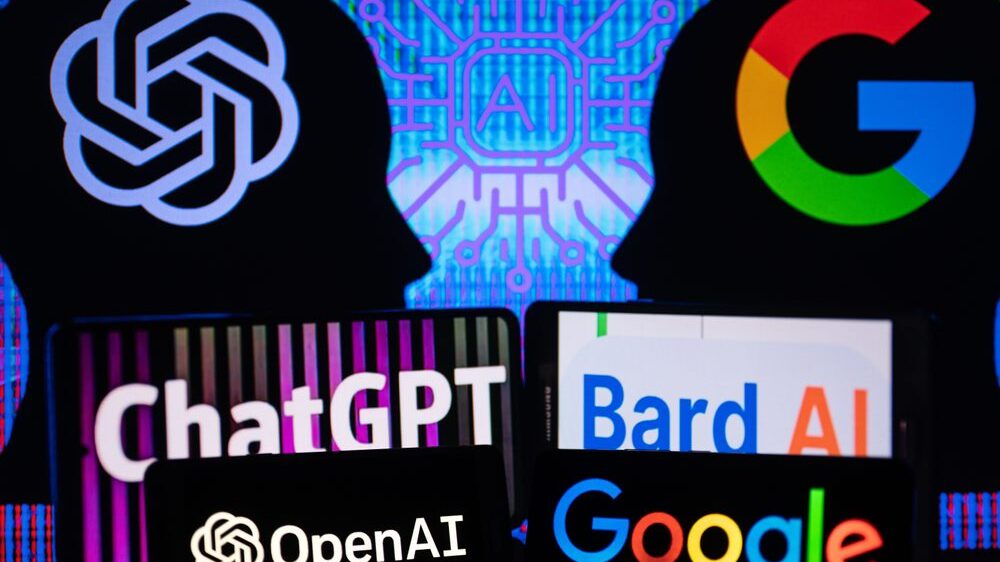
Illustration: JRdes / Shutterstock.com
A mysterious ban on Google chatbot technology is fueling fears that onerous EU privacy regulations may prevent the sale of AI products in the bloc. Pundits, meanwhile, lament that Europe is falling behind in the digital transition.
Digital technology magazine Wired reported this week that both EU lawmakers and industry experts are uncertain why the recently launched Google Bard platform, designed to be Google’s response to ChatGPT, is not available to 450 million European consumers.
The tech giant has so far provided zero clarity for the ban but some MEPs have speculated that looming AI rules and the General Data Protection Regulation (GDPR) likely frightened Google away from the EU market as legislators ponder more AI regulation.
‘Bard’ debuted last month to mixed reviews and is Google’s contribution to the fast-developing field of generative AI technology.
The EU and Canada were the few jurisdictions in the West excluded from the Bard rollout which is freely available in the UK, America, and India, as well as most of the developing world.
#bard is available in 180 countries, but a couple of important ones are still missing: Canada, Brazil, China and all of the EU: pic.twitter.com/xK0bMUy1Pa
— Mathijs Vogelzang (@thijser) May 12, 2023
Speaking to Wired, Italian socialist MEP Brando Benifei expressed uncertainty as to why Google had embargoed the service. Many experts believe that generative AI technology simply isn’t compatible with stringent EU regulations.
Policy analyst Daniel Leufer commented that GDPR and the EU’s pending AI Act and its implementation may have also influenced Google’s decision to pull the product’s sale.
There’s a lingering question whether these very large data sets, that have been collected more or less by indiscriminate scraping, have a sufficient legal basis under the GDPR.
AI regulation is a major sticking point for the EU’s legislative agenda. The European Parliament recently agreed on a framework for the world’s first AI Act that imposes strict risk assessment and privacy rules on companies with a ban on the use of new technology for discriminatory purposes.
Google is conducting a cautious approach to the AI Act, apprehensive of how its implementation may affect its services. The U.S. government has been quietly warning Europe to back away from AI regulation for fear of crushing innovation.
“The Digital Services Act is essentially the legalization of content regulation on the internet.”@Norm_Lewis #EUnews
— The European Conservative (@EuroConOfficial) May 16, 2023
The #digitaltransition will be the topic of discussion at our next #apathforward event.
Register today!⤵️ pic.twitter.com/Xd4LXKwXpM
Italy announced a temporary ban on ChatGPT last month when the unexpected arrival of ChatGPT forced the EU back to square one on AI regulation earlier this year.
Brussels has been accused of trying to suck the life out of the AI revolution through overregulation. The EU’s Digital Services Act has led to a bust-up between Eurocrats and Silicon Valley over hate speech regulation.
The looming prospect of AI-powered automation could shatter the sheltered economic ecosystem that is 21st-century Europe. Many citizens are already left out in the cold by Brussels’ refusal to embrace the inevitable AI revolution.
The roadmap to digitalization is riddled with unforeseen consequences, with the loss of control over private and public spaces among them. Policy experts and researchers will gather for a panel discussion May 24th, hosted by The European Conservative. The event, “A Path Forward: Coding a New Europe?” will consider the impact of the A.I. Act and the Data Act on ordinary people. The group will meet from 12-14:30 at Silversquare, Square de Meeûs, in Brussels. The event is free and open to the public, but registration is required.
